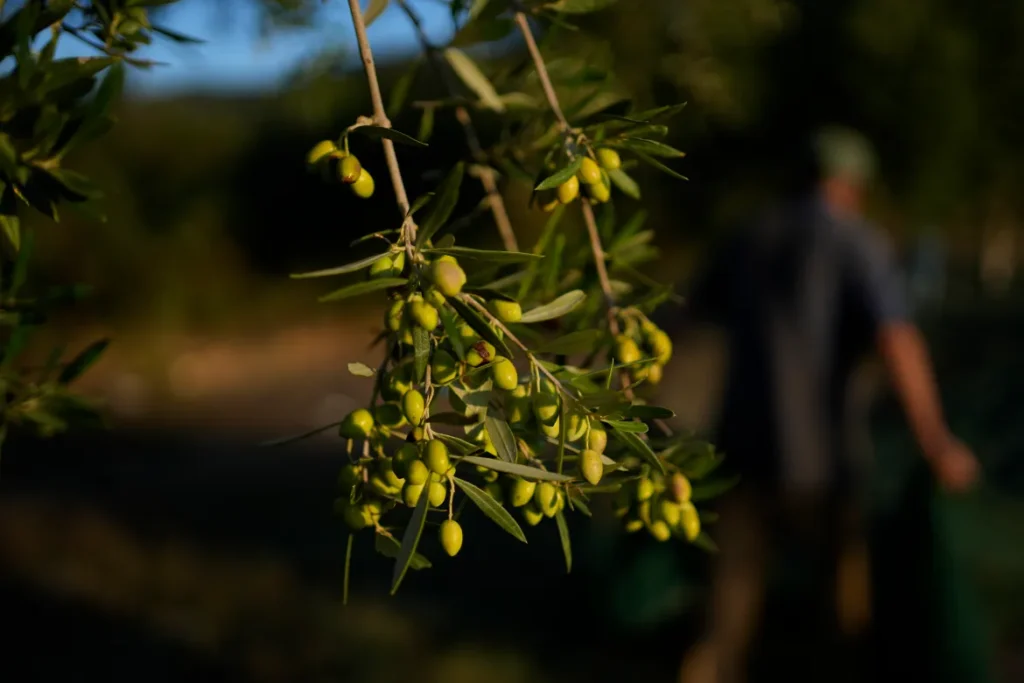Thieves have become increasingly brazen, snatching tractors and expensive equipment along with olives.
In an olive grove on the outskirts of Greece’s capital, Athens, grower Konstantinos Markou pushes aside the shoots of new growth to reveal the stump of a tree – a roughly 150-year-old specimen, he said, that was among 15 cut down on his neighbour’s land by thieves eager to turn it into money.
Surging olive oil prices, driven in part by two years of drought in Spain, has meant opportunity for criminals across the Mediterranean.
Warehouse break-ins, dilution of premium oil with inferior product, and falsification of shipping data are on the rise in olive-growing heartlands of Greece, Spain and Italy. And perhaps worst of all: Gangs using chainsaws to steal heavily laden branches and even entire trees from unguarded groves.
“The olive robbers can sometimes produce more oil than the owners themselves – seriously,” Markou said, before heading off to patrol his own grove at nightfall. The crimes mean fewer olives for growers already contending with high production costs and climate change that has brought warmer winters, major flooding and more intense forest fires.
In Italy’s southern Puglia region, growers are pleading with police to form an agriculture division. Greek farmers want to bring back a rural police division that was phased out in 2010. In Spain, a company has developed tracking devices that look like olives to try and catch thieves.
After decades of growth, the global olive oil market has been disrupted by a nearly two-year drought in Spain, which typically accounts for about 40 percent of world supply.
Benchmark prices in Spain, Greece and Italy for extra virgin oil reached 9 euros ($4.35 per 0.45kg or pound) in September, more than tripling from their level in 2019.
That’s translated to higher prices for consumers. In Greece, a one-litre bottle of extra virgin oil jumped from $8 to $9 last year to as much as $15 this year.
Farmers around Italy’s southwestern port city of Bari say thieves have become increasingly brazen, snatching tractors and expensive equipment along with olives.
Spanish police said in October they had retrieved 91 tonnes of stolen olives in recent weeks. In February, six people were arrested in southern Greece for the theft of 8 tonnes of olive oil in a series of warehouse break-ins over several weeks.
The regional agricultural association issued a plea for police assistance following reports that 100 olive trees were destroyed or seriously damaged in a single incident last month. Gennaro Sicolo, the association’s leader, called the economic damage ‘enormous’ and said ‘farmers must be protected’.
‘The [robbers] look for heavily loaded branches and they cut them,’ said Neilos Papachristou, who runs an olive mill and nearby grove in a fourth-generation family business. ‘So, not only do they steal our olives, but they cause the tree serious harm. It takes four-five years for it to return to normal.’
The thefts are driving some growers to harvest early, which means accepting lower yields to avoid long-term damage to their trees. That includes Christos Bekas, who was among the farmers at Papachristou’s mill who were dumping their crop into stainless steel loading bins, untying sacks and tipping over tall wicker baskets from the back of their pickup trucks.
Bekas, yang memiliki 5.000 pohon zaitun, berulang kali digerebek oleh pencuri sebelum memutuskan untuk memanen lebih awal. Untuk menghasilkan satu kilogram minyak dibutuhkan dua setengah kali lebih banyak buah zaitun dibandingkan tahun lalu, katanya. ‘Dan semua ini terjadi setelah kami bermalam menjaga ladang kami,’ katanya. “Situasinya mengerikan.”
‘Ini merupakan kejahatan besar,’ kata Markou, petani asal Yunani, mengenai penebangan pohon. ‘Kau membunuh sejarahmu sendiri di sini.’
Kebun zaitun di luar Athena adalah bagian dari tradisi yang sudah ada sejak zaman kuno, di dataran yang kini mengelilingi bandara internasional kota tersebut. Beberapa pohon berusia berabad-abad
Source: Al Jazeera


